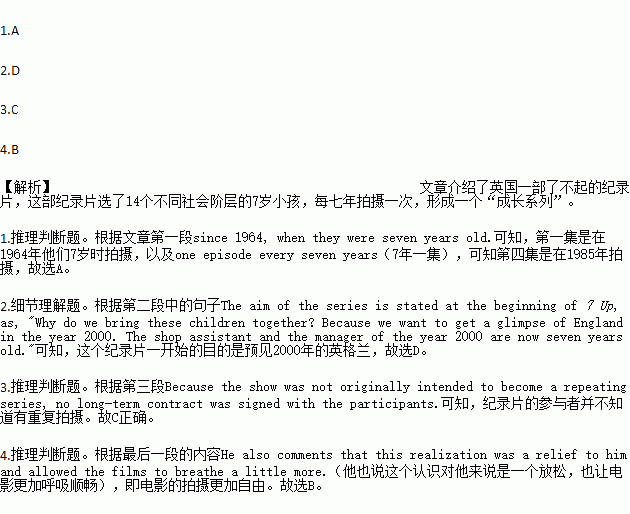题目内容
The UP Series is a series of documentary films produced by Granada Television that have followed the lives of fourteen British children since 1964, when they were seven years old. So far the documentary has had eight episodes(连续剧) lasting 49 years (one episode every seven years) and the documentary has been broadcast on both ITV and BBC.
The children were selected to represent the range of social economic backgrounds in Britain at that time, with the assumption that each child’s social class predetermines their future. Every seven years, the director, Michael Apted, films material from those of the fourteen who choose to participate. The aim of the series is stated at the beginning of 7 Up, as, "Why do we bring these children together? Because we want to get a glimpse of England in the year 2000. The shop assistant and the manager of the year 2000 are now seven years old."
The subjects are first seen on a group visit to London Zoo, where the narrator announces “We brought these 20 children together for the very first time.” The series, however, only follows fourteen. Because the show was not originally intended to become a repeating series, no long-term contract was signed with the participants. The interviews since 7 Up have been voluntary, although the participants have been paid an unknown sum for their appearance in each film.
Although the series began as a political documentary, it has become a film of human nature. In the director’s commentary for 42 Up, Apted comments that he did not realize the series had changed tone from political to personal until 21 Up. He also comments that this realization was a relief to him and allowed the films to breathe a little more.
1.When was the fourth episode of the series made?
A. 1985. B. 1992. C. 2000. D. 2005.
2.What was the goal of the Up Series at the beginning?
A. To research human nature.
B. To predict the future job changes.
C. To gather the 20 children together.
D. To foresee England in the year 2000.
3.What can we learn about the participants in the documentary?
A. They joined in it for free.
B. They were not on good terms.
C. They did not expect a repeating series.
D. They were praised for their appearance.
4.Why did Apted think the realization was a relief?
A. He could breathe a little more.
B. He could direct the films more freely.
C. He had finished the whole series finally.
D. He changed his idea about human nature.
 小学夺冠AB卷系列答案
小学夺冠AB卷系列答案 ABC考王全优卷系列答案
ABC考王全优卷系列答案
